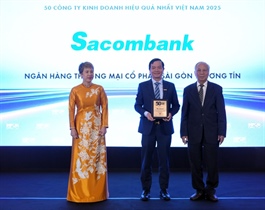Việt Nam urged to embrace blockchain for cross-border payments
Việt Nam urged to embrace blockchain for cross-border payments
The passage of the Law on Digital Technology Industry and the Government’s Resolution 05/2025/NQ-CP on piloting a digital asset market had created a new legal framework.

Experts discuss about cross-border payments in Việt Nam. — Photo courtesy of VBA |
With global cross-border payments projected to reach US$320 trillion by 2032, Vietnam is being urged to adopt blockchain, stablecoins, and regulatory sandboxes to enhance competitiveness and expand financial integration. Experts say the country must act now to modernise its payment infrastructure and keep pace with international trends.
At a workshop on 'Cross-border Payments: Global Trends and Solutions for Việt Nam' held on Tuesday, policymakers, financial institutions, technology firms and international partners gathered to discuss opportunities and challenges in reshaping the country’s payment system.
Chairman of the Việt Nam Blockchain and Digital Asset Association (VBA) Phan Đức Trung said the passage of the Law on Digital Technology Industry and the Government’s Resolution 05/2025/NQ-CP on piloting a digital asset market had created a new legal framework.
“This allows Việt Nam to actively experiment with financial–technology models in a tightly controlled environment, building the data and experience needed to design policies aligned with international practices and support cross-border payment initiatives,” Trung said.
According to Trần Huyền Dinh, Head of the VBA Fintech Application Committee and Project Director of Basal Pay at AlphaTrue Solutions, global cross-border payment flows reached nearly $200 trillion in 2024 and could climb to $320 trillion by 2032, citing data from the Bank for International Settlements (BIS). But current systems remain costly and slow.
“The correspondent banking network via SWIFT underpins large-scale B2B transfers but requires multiple intermediaries, driving up costs and delaying transactions. International remittance services are faster but expensive and lack real-time transparency, while global card networks like Visa and Mastercard add as much as $187 billion annually in transaction fees,” he said.
Stablecoin, Dinh argued, offers a complementary 'rail' that is low-cost, transparent and operates 24/7. He pointed to the Basal Pay project in Đà Nẵng, the first licensed conversion service from digital assets to fiat under a regulatory sandbox in Việt Nam. The solution integrates blockchain, regtech, and compliance with KYC/AML/CFT standards, reducing costs by approximately 30 per cent compared to traditional channels.
World Bank data show that remittances to Việt Nam reached $16–18 billion in 2024, equivalent to approximately 4 per cent of GDP, placing the country among the world’s top 10 recipients. With rising flows from overseas workers, freelancers and tourism, Dinh said the demand for faster, cheaper and more transparent payment channels is urgent.
“Blockchain and stablecoin will not replace existing models but can significantly improve efficiency, security and user experience, while supporting Việt Nam’s efforts to enhance anti-money laundering compliance and move off the FATF grey list,” he added.
From a global perspective, Matthew Crow, Regional Development Director at Tether, highlighted that stablecoin transactions exceeded $26 trillion in 2024, with $2.1 trillion tied directly to real-world payments, including remittances, e-commerce, and business transfers.
“Stablecoin is emerging as a viable complement to traditional systems, addressing cost and speed constraints while enhancing transparency,” he said, adding that Việt Nam’s growing role in tourism and the digital workforce makes it a prime candidate for pilot adoption.
Economist Võ Trí Thành, Vice President of the Central Institute for Economic Management and a member of the National Financial and Monetary Policy Advisory Council, emphasised that cross-border payments must be closely managed within the broader monetary and remittance framework.
“Legal compliance, consumer rights and dispute resolution are the most critical factors for building trust in any new system,” he said.
Other experts echoed both the opportunities and risks. Nguyễn Hải Nam, Standing Member of the National Assembly’s Economic Committee, said Việt Nam’s legal environment has made progress with the Digital Technology Industry Law, but urged caution given varying global stances on blockchain and stablecoin.
Representatives from 1Matrix, AFA Capital, VWA and Krysos Trust also highlighted Việt Nam’s strong fintech talent pool and international co-operation opportunities. Still, they pointed to challenges in balancing innovation with compliance as global standards tighten.
According to the International Monetary Fund, 80 per cent of central banks worldwide are exploring or testing central bank digital currencies (CBDCs), signalling a fast-changing payments landscape.
“Projects like Basal Pay, combined with cooperation from international partners such as Tether, will provide essential data and practical insights to help Việt Nam strengthen autonomy and position itself in the regional race to build next-generation payment infrastructure,” said Nguyễn Trần Minh Quân, CEO of Krysos Trust.
- 08:56 01/10/2025
























